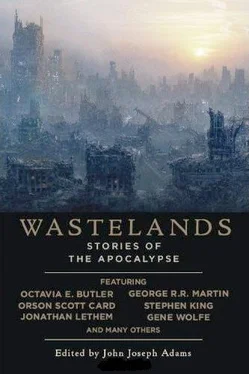When he was eight and I was fifteen, he came to me and said he had invented an airplane. By then I knew Bobby too well to just say "Bullshit" and kick him out of my room. I went out to the garage, Where there was this weird plywood contraption sitting on his American Flyer red wagon. It looked a little like a fighter plane, but the wings were raked forward instead of back. He had mounted the saddle from his rocking horse on the middle of it with bolts. There was a lever on the side. There was no motor. He said it was a glider. He wanted me to push him down Carrigan’s Hill, which was the steepest grade in D.C.’s Grant Park—there was a cement path down the middle of it for old folks. That, Bobby said, would be his runway.
"Bobby," I said, "you got this puppy’s wings on backward."
"No," he said. "This is the way they’re supposed to be. I saw something on Wild Kingdom about hawks. They dive down on their prey and then reverse their wings coming up. They’re double-jointed, see? You get better lift this way."
"Then why isn’t the Air Force building them this way?" I asked, blissfully unaware that both the American and the Russian air forces had plans for such forward-wing fighter planes on their drawing boards.
Bobby just shrugged. He didn’t know and didn’t care.
We went over to Carrigan’s Hill and he climbed into the rocking-horse saddle and gripped the lever. "Push me hard" he said. His eyes were dancing with that crazed light I knew so well—Christ, his eyes used to light up that way in his cradle sometimes. But I swear to God I never would have pushed him down the cement path as hard as I did if I thought the thing would actually work.
But I didn’t know, and I gave him one hell of a shove. He went freewheeling down the hill, whooping like a cowboy just off a traildrive and headed into town for a few cold beers. An old lady had to jump out of his way, and he just missed an old geezer leaning over a walker. Halfway down he pulled the handle and I watched, wide-eyed and bullshit with fear and amazement, as his splintery plywood plane separated from the wagon. At first it only hovered inches above it, and for a second it looked like it was going to settle back. Then there was a gust of wind and Bobby’s plane took off like someone had it on an invisible cable. The American Flyer wagon ran off the concrete path and into some bushes. All of a sudden Bobby was ten feet in the air, then twenty, then fifty. He went gliding over Grant Park on a steepening upward plane, whooping cheerily.
I went running after him, screaming for him to come down, visions of his body tumbling off that stupid rocking-horse saddle and impaling itself on a tree, or one of the park’s many statues, standing out with hideous clarity in my head. I did not just imagine my brother’s funeral; I tell you I attended it. " BOBBY !" I shrieked. " COME DOWN !"
" WHEEEEEEEE !" Bobby screamed back, his voice faint but clearly ecstatic. Startled chess-players, Frisbee-throwers, book-readers, lovers, and joggers stopped whatever they were doing to watch.
" BOBBY THERE’S NO SEATBELT ON THAT FUCKING THING ." I screamed. It was the first time I ever used that particular word, so far as I can remember.
" Iyyyyll beeee all riyyyyht … " He was screaming at the top of his lungs, but I was appalled to realize I could barely hear him. I went running down Carrigan’s Hill, shrieking all the way. I don’t have the slightest memory of just what I was yelling, but the next day I could not speak above a whisper. I do remember passing a young fellow in a neat three-piece suit standing by the statue of Eleanor Roosevelt at the foot of the hill. He looked at me and said conversationally, "Tell you what, my friend, I’m having one hell of an acid flashback."
I remember that odd misshapen shadow gliding across the green floor of the park, rising and rippling as it crossed park benches, litter baskets, and the upturned faces of the watching people. I remember chasing it. I remember how my mother’s face crumpled and how she started to cry when I told her that Bobby’s plane, which had no business flying in the first place, turned upside down in a sudden eddy of wind and Bobby finished his short but brilliant career splattered all over D Street.
The way things turned out, it might have been better for everyone if things had actually turned out that way, but they didn’t. Instead, Bobby banked back toward Carrigan’s Hill, holding nonchalantly onto the tail of his own plane to keep from falling off the damned thing, and brought it down toward the little pond at the centre of Grant Park. He went air-sliding five feet over it, then four… and then he was skiing his sneakers along the surface of the water, sending back twin white wakes, scaring the usually complacent (and overfed) ducks up in honking indignant flurries before him, laughing his cheerful laugh. He came down on the far side, exactly between two park benches that snapped off the wings of his plane. He flew out of the saddle, thumped his head, and started to bawl.
That was life with Bobby.
Not everything was that spectacular—in fact, I don’t think anything was… at least until The Calmative. But I told you the story because I think, this time at least, the extreme case best illustrates the norm: life with Bobby was a constant mind-fuck. By the age of nine he was attending quantum physics and advanced algebra classes at Georgetown University. There was the day he blanked out every radio and TV on our street—and the surrounding four blocks—with his own voice; he had found an old portable TV in the attic and turned it into a wide-band radio broadcasting station. One old black-and-white Zenith, twelve feet of hi-fi flex, a coat hanger mounted on the roof peak of our house, and presto! For about two hours four blocks of Georgetown could receive only WBOB…which happened to be my brother, reading some of my short stories, telling moron jokes, and explaining that the high sulphur content in baked beans was the reason our dad farted so much in church every Sunday morning. "But he gets most of ’em off pretty quiet," Bobby told his listening audience of roughly three thousand, "or sometimes he holds the real bangers until it’s time for the hymns."
My dad, who was less than happy about all this, ended up paying a seventy-five-dollar FCC fine and taking it out of Bobby’s allowance for the next year.
Life with Bobby, oh yeah…and look here, I’m crying. Is it honest sentiment, I wonder, or the onset? The former, I think—Christ knows how much I loved him—but I think I better try to hurry up a little just the same.
Bobby had graduated high school, for all practical purposes, by the age of ten, but he never got a B.A. or B.S., let alone any advanced degree. It was that big powerful compass in his head, swinging around and around, looking for some true north to point at.
He went through a physics period, and a shorter period when he was nutty for chemistry… but in the end, Bobby was too impatient with mathematics for either of those fields to hold him. He could do it, but it—and ultimately all so-called hard science bored him.
By the time he was fifteen, it was archaeology—he combed the White Mountain foothills around our summer place in North Conway, building a history of the Indians who had lived there from arrowheads, flints, even the charcoal patterns of long-dead campfires in the Mesolithic caves in the mid-New Hampshire regions.
But that passed, too, and he began to read history and anthropology. When he was sixteen my father and my mother gave their reluctant approval when Bobby requested that he be allowed to accompany a party of New England anthropologists on an expedition to South America.
He came back five months later with the first real tan of his life; he was also an inch taller, fifteen pounds lighter, and much quieter. He was still cheerful enough, or could be, but his little-boy exuberance, sometimes infectious, sometimes wearisome, but always there, was gone. He had grown up. And for the first time I remember him talking about the news… how bad it was, I mean. That was 2003, the year a PLO splinter group called the Sons of the Jihad (a name that always sounded to me hideously like a Catholic community service group somewhere in western Pennsylvania) set off a Squirt Bomb in London, polluting sixty per cent of it and making the rest of it extremely unhealthy for people who ever planned to have children (or to live past the age of fifty, for that matter). The year we tried to blockade the Philippines after the Cedeno administration accepted a "small group" of Red Chinese advisors (fifteen thousand or so, according to our spy satellites), and only backed down when it became clear that (a) the Chinese weren’t kidding about emptying the holes if we didn’t pull back, and (b) the American people weren’t all that crazy about committing mass suicide over the Philippine Islands. That was also the year some other group of crazy motherfuckers—Albanians, I think—tried to air-spray the AIDS virus over Berlin.
Читать дальше












